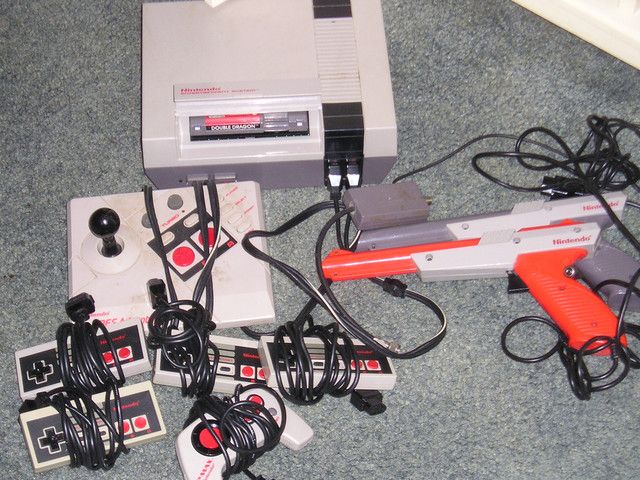Sony and Microsoft don't manufacture their hardware anyway, they get Foxxcon to do it.
Xbox 360 didn't sell for a huge loss:
http://www.wired.com/gamelife/2007/05/ps3_vs_xbox_360/
Yeah, hardware as capable as Xbox 360 Elite was made for $320 in 2007. I remind you the Elite console included a small form-factor $120GB hard drive back then hare drives that small and that high capacity were balls expensive. Now Hard drive price is plummeting for capacity greater than we knew what to do with.
If they didn't the PS3 would have cost upwards of 800$ at launch.
That's not for high performance, that's for obtusely different components. Shit like the Cell processor was very expensive but made virtually no difference to performance.
Even if the console cost $60 more, that is ONE PURCHASE to play ALL CONSOLE GAMES! There is no possibility of suddenly needing to drop another $400 on another console because a game you really like has come out but on the other system.
The fact is public are cottoning on to the "loss leader" plan utterly fucks them over. Yeah they pay $250 rather than $330 up front, but then EVERY NEW GAME costs and extra $15 in licencing. $15 adds up. You buy 5 games, that's $75 buck, and I'd probably spend more than 5x$60 on games if each game was $45.
People are used to paying high up front costs for low running, million of people spend $800 on a phone then won't pay more than a 2 bucks for an app they use every day.
"Then to tack on the cross compatibility you're going to have an increase."
Fuck cross compatibility of different hardware. Send ONE HARDWARE SPEC SHEET to Foxconn, and they make ONE CHIPSET! Any upgrades would be by agreement with the consortium. The design DOWN TO THE FUNDAMENTALS is licensed out to anyone with the factory to make them to adequate standards. As consoles are in fact made today. Upgrades would mainly be in cost cutting, power-reduction, and form factor, they would all be functionally identical until a new series upgrade was made, normally after 3-4 moore's law cycles where there is an order of magnitude increase in processing capability.
" Custom means it wouldn't take advantage of the PS3 or 360 price drops"
It would. The consortium would work on redesigns to licence out to manufacturers like Foxconn, Toshiba, etc which would be cheaper to make.
" You're looking at a single system that's over 1000$ just to break even. If you want even a modest profit you're going to have to sell them for 1200 or 1500."
You're trying to make a $500 margin on a $1500 mass produced product. HUNDREDS OF MILLIONS of these are going to be sold and you're trying to be so greedy. you'll end up with nothing as your competition will undercut so easily and willingly undercut? Mass produced things like these do far better on slimmer margins. Plus you pulled the $1000 out of nowhere.
Bottom line: a Uni-console in 2007 would have sold for $350 and games would have sold for $45.
Today there are even better options. Have entirely modular data-storage so you don't pay for any more than you need and can shop around for any hard drive you like at the price you like. Hard Disk Drives are so standardised they can be plugged in like N64 cartridges, just remember to power down the device before you insert/remove. Same as with N64 and every cartridge based handheld today. So that cuts a lot off the price.
AMD, Nvidia and Intel are developing very low cost "systems on a chip" that is GPU and CPU all on one chip that can be mass produced. Investing in one design will make it very cheap to make a single very capable system.
So with modular memory cutting cost, modern technology that makes powerful hardware no longer so expensive it needs to be loss leading, and the changing consumer trends of awareness of high running costs, a uni-system is very viable.
One advantage of this is how manufacturers can take the basic spec and release it in different form factors.
Ultimately the consortium would only have control over one thing, the configuration of the main-board that would have integrated GPU and CPU and standards for what type of interface they need like must have this type of power supply and so on. But beyond that manufacturers would have a free reign.
Samsung could integrate it into a TV. Another company could make a more cube shaped version, another a wide and ultra slim one. One could have a tray loading DVD drive, another slot loading.
but once the game is in the drive, they all play the exact same way, controller inputs are the same, the Video output is the same. But a company could make a laptop version, with an integrated screen and battery power. This exists already for Xbox 360 but it's a very expensive custom conversion mod that is totally unauthorised. Opening up the "set board" would mean a company could buy the base boards from Foxconn (built under licence to specification of the consortium) or whichever factory makes them as a discrete component. Then you jsut get compatible memory-storage modules (SSD, HDD, SD-card, you name it)
new smaller boards would be released over time, taking up less space and using less power. Eventually they'd be the size of a tablet and conceivably a company could buy the motherboard, construct a tablet around it and sell it as that.
It would be an open market of designs but it wouldn't be fractured by how each different design had games exclusivity. There are so many different DVD player designs but they all play DVDs!


